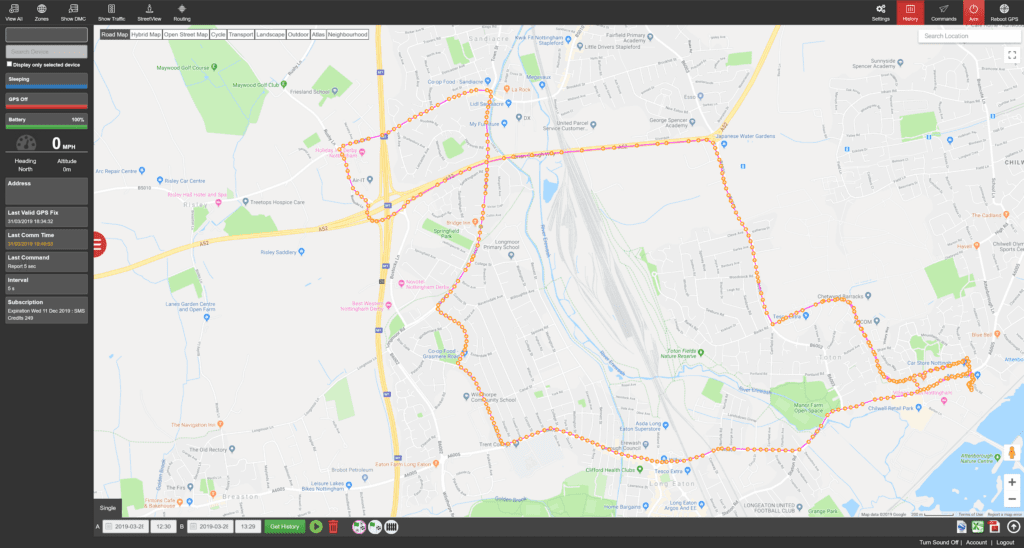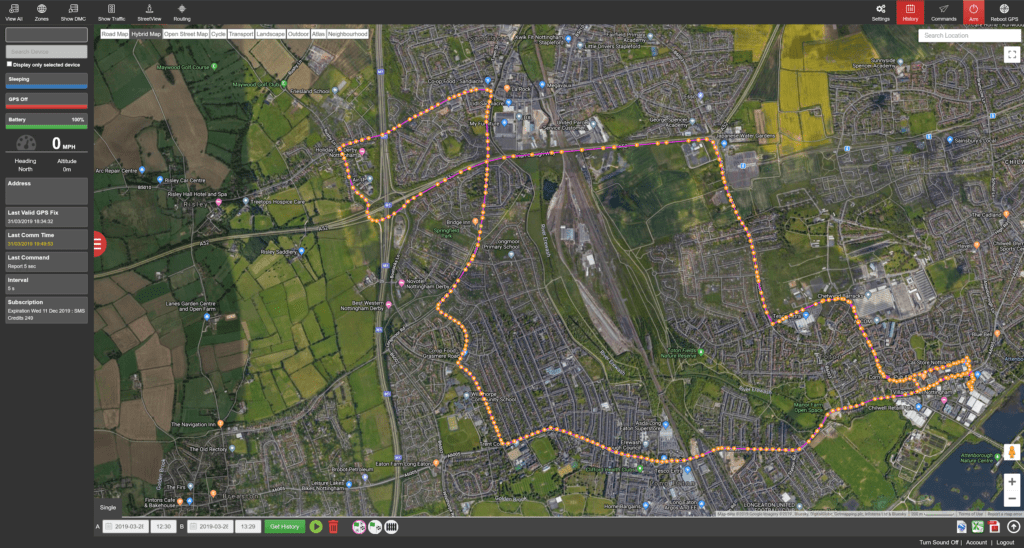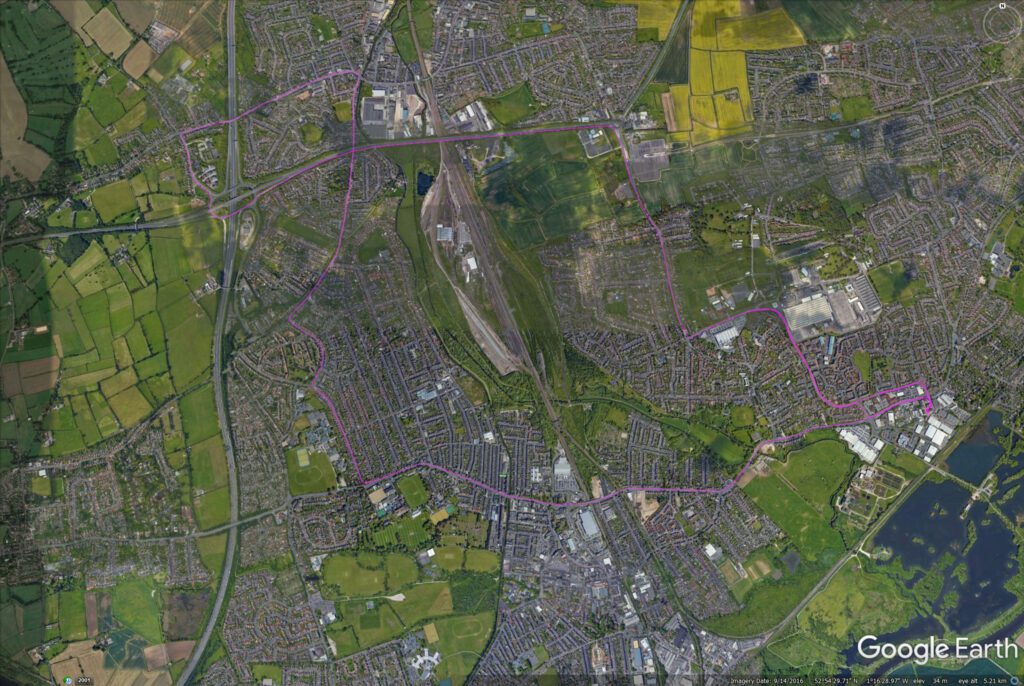Originally posted in 2009. Updated annually, so here’s the 2023 version. It’s the start of March and wintry showers have started (heavier snow in some places). The papers are full of dire warnings about the coldest winter since 10,000 BC (the last Ice Age). Same as every year. The original article follows.
Further to a post about cancelled lessons due to weather, I noticed on one forum a couple of years ago someone getting all excited about how there might be a market for specialised snow lessons at premium prices. As of October 2018 (and it hasn’t got even close to snowing yet), some instructors are already going on about not doing lessons.
Let’s have a reality check here.
Until February 2009, it hadn’t snowed to any appreciable extent in the UK for around 26 years! We had two bad winters, but since then they have been relatively mild ones with almost no snow. Even when we get a little of the white stuff it is usually gone inside a week or two at most. Snow – and especially in the UK – is usually extremely localised. The media talks it up so it sounds like the whole country is blanketed in a metre of the stuff, especially if a few wet flakes fall in London. This is enough to have people cutting down each others trees for their wood-fired stoves, and panic buying Evian at the local Waitrose. It can keep the BBC news bulletins going for days at a time.
Every year, incompetence and bureaucracy at local councils typically means that every time there is any bad weather, it’s like they’ve never experienced it before. This – and the media hyping it to death – makes things seem a lot worse than they really are. Having a ‘specialised snow Instructor’ in the UK (especially in England) would be like having a fleet of icebreakers sailing the Mediterranean: bloody stupid! Back here on Planet Earth, I will carry on doing things the way I always have done: use whatever weather comes to hand as a teaching opportunity if it is appropriate, and charging normal lesson rates for it.
One bit of advice. Make sure you have the right mixture in your wash bottle, and a scraper for removing any frost or snow. A further bit of advice. Never, ever, ever be tempted to buy a metal-bladed ice scraper. Always plastic. Trust me, I’ve tested metal ones for you, and you are welcome. Don’t use metal.
Will my driving lessons be cancelled due to snow?
It depends on how much of it there is, how far advanced you are with your training, and your instructor’s attitude to teaching in snow. There is no rule that says you mustn’t have lessons in snow. In fact, it makes a lot of sense to do them if you can to get valuable experience. But beginners perhaps shouldn’t because it’s just too dangerous for them. It’s your instructor’s decision, even if you want to do it.
Do driving lessons get cancelled when there is snow?
Yes. It depends on how much snow and how advanced you are as a learner driver. If your instructor cancels then you should not get charged. If you are, find another instructor quickly.
If the police are advising people not to travel unless it’s essential, having a driving lesson in those conditions is a bad idea. That’s when they’re likely to be cancelled.
Also bear in mind that it doesn’t matter if you’re learning with the AA, BSM, Bill Plant, or any other driving school. The decision is down to your instructor based on the weather in your area.
Will my instructor tell me if my lesson is cancelled?
Yes. If he or she doesn’t (or just doesn’t turn up without telling you), find another. But why take the chance? Just call or text him and ask.
My instructor says he isn’t insured for icy weather
Someone found the blog on that search term (February 2018). I’m telling you in the most absolute terms possible that this is utter nonsense. I have never heard of insurance which says you can’t drive in certain weather, and especially not driving instructor insurance. If anyone tells you this, find another instructor quickly.
Do [driving school name] cancel lessons due to bad weather?
Cancelling lessons due to bad weather is down to the instructor and not the driving school they represent. So it doesn’t matter which school you are with. But yes, lessons can be cancelled for bad weather.
Any decent instructor might cancel lessons due to too much snow – either falling, or on the ground – making driving dangerous. They might also cancel due to thick fog, strong winds, and heavy rain/flooding. The decision lies solely with the instructor. If you disagree with their decision, find another one.
Will I have to pay for my lesson if it’s cancelled due to snow?
There is no specific law which says your instructor can’t charge you, but if he or she does it goes against all the principles of Common Decency. You should not be charged for bad weather cancellations initiated by your instructor. If you are, find another instructor as soon as possible.
However, if it’s you who wants to cancel, but your instructor wants to go ahead with the lesson, it’s a little more tricky. You being nervous is not the same as it being genuinely too dangerous. I had someone once who would try to cancel for light rain, bright sun, mist, and wind when she didn’t feel like driving. You’ll need to sort this out yourself, but as in all other cases, if you’re not happy just find a different instructor – being aware that if the problem is you, the issues won’t go away.
I want to do the lesson, but my instructor said no
You need to be realistic about the conditions. Just because your test is coming up, for example, and you don’t want to have to move it doesn’t alter the fact that the weather might just be too dangerous to drive in on the day of the lesson. When I cancel lessons in snow it’s usually with my newer pupils who I know can panic and brake too hard. On the other hand, if the police are advising against travel, or if the roads are at a standstill, I will cancel a lesson no matter who it is.
As an example, one day in 2016 it began snowing heavily about 30 minutes before I was due to pick someone up late one morning. The roads quickly got covered and traffic began to slow down. His house was on a slope, and it was clearly becoming difficult to drive without slipping. I made a choice there and then to cancel the lesson. The snow lasted for about as long as his lesson would have, but was gone by the afternoon. Cancelling was the right decision.
Do lessons in snow cost more?
No. If you’re charged extra for normal driving lessons in snow, find another instructor immediately.
I’m worried about driving lessons in snow
Don’t be. You’re going to have to do it when you’ve passed, and it makes sense to learn how to do it now while you have the chance. A lot of people never see snow until they’ve passed their tests, then they don’t know what to do and end up crashing, like the red car in the picture above.
You should never drive in snow
That’s total rubbish. Unless the advice is ‘not to travel unless it is absolutely necessary’, doing lessons on snow or ice is extremely useful for when you pass. Partially melted snow is ideal for doing ‘snow lessons’ if you have the right instructor. The one thing you do need is to make sure you are suitably equipped in case you get caught out. A scraper, de-icer, the right liquid in your wash bottle – and perhaps a pair of snow socks.
But irrespective of that, no matter how much snow experience you have, your test could easily be cancelled if there is snow at the time. Just accept it.
Do YOU do lessons in snow?
Generally speaking, yes – as long as I feel it is safe to do so, and unless the advice is ‘not to travel unless it is absolutely necessary’. I do not do lessons in snow because I am desperate for the money – I will happily cancel if I believe it is too dangerous. And sometimes it is. For example, in this 2021 update, I cancelled two late afternoon lessons on the day it began snowing hard (after finishing the one I was on while it was coming down), because the first is trigger-happy with his foot at the best of times, and the other would have been after the slush froze (and it froze bloody hard). And I didn’t know how long it would snow for, or how much we’d get.
Why do YOU do lessons in snow?
A while back, not long after I became an instructor, we had two winters where it snowed properly for the first time in around 26 years. I had not experienced it as an instructor before, and I cancelled a lot of lessons. After several weeks I realised I was being over-cautious. It was one of those head-slapping moments, and I recognised that I could actually use the snow as a teaching aid. Not with the beginners or nervous ones, but the more advanced ones definitely.
 Basically, if the snow is melting and main roads are clear, there’s no reason not to do lessons. We can dip into some quiet roads and look at how easy it is to skid. If the snow is still falling and main roads are affected by lying snow, then doing lessons carries a much greater risk. A bit of common sense tells you what you can and can’t get away with.
Basically, if the snow is melting and main roads are clear, there’s no reason not to do lessons. We can dip into some quiet roads and look at how easy it is to skid. If the snow is still falling and main roads are affected by lying snow, then doing lessons carries a much greater risk. A bit of common sense tells you what you can and can’t get away with.
I can state with absolute certainty that every single pupil has benefitted from driving lessons on snow if the chance has arisen for them.
Will my driving test be cancelled due to snow?
It is very likely. You need to phone up the test centre on the day using the number on your email confirmation and check. Otherwise, you must turn up – even if they cancel it at the last minute. If you don’t, you’ll probably lose your test fee – or end up having a drawn-out argument over it. Make life simple and follow the guidelines.
At one time, tests wouldn’t go out if there was any snow at all in Nottingham. In February 2018 during the visitation by ‘The Beast from the East’ (aka the ‘Kitten in Britain’), I had an early morning test go out with substantial snow on the side roads, repeated snow showers, and a temperature of -4°C showing on my car display. My wiper blade rubbers were solid, and making that horrible sound when they bounce instead of glide. I was amazed (but the pupil passed anyway). You can never be certain, but be prepared.
If my test is cancelled, will I have to pay for another?
No. They will send you a new date within a few days (or you can phone them or look it up online). And it will not count as one of your ‘lives’ for moving your test.
Can I claim for out of pocket expenses if my test is cancelled?
No. Neither you, nor your instructor, can claim any money back. And you shouldn’t be charged for your lesson or car hire that day if your instructor is in any way reputable.
It’s happened to me several times on pupils’ test days. If a test is cancelled due to the weather, I do not charge them. I can’t really see any reason why yours should, either. If they do, you need to start asking yourself serious questions about them.
Will snow stop a driving test?
YES. Snow can easily stop a test, or prevent it from going ahead. It doesn’t matter how you phrase the question, or who you ask, if there is snow then the test could easily be affected. They tell you all this when you book it.
Driving tests cancelled due to snow [insert year here]…
It doesn’t matter if it’s 1821, 1921, 2021, or any other date. If there is snow on the roads and/or it is icy then your test may well be cancelled. It doesn’t matter what you, your instructor, or your mum or dad says, or – in 2021, 2022, or 2023 (and counting) – that there’s a long waiting list for test dates due to COVID. It is up to the test centre to decide.
Why was my driving test cancelled because it snowed?
Driving in snow is dangerous even for experienced drivers. The side streets will likely be covered in sheet ice and compacted snow and you will skid if you even drive carefully on them. You could easily lose control. That’s why there are so many accidents in snow and icy conditions. You are a new driver and you probably haven’t driven on snow before. DVSA cannot take the risk, and you have to accept it.
PHONE YOUR TEST CENTRE TO FIND OUT IF TESTS ARE CANCELLED AT THAT TEST CENTRE BEFORE YOU SET OFF – YOU WON’T FIND THE ANSWER GOOGLING FOR IT. DECISIONS ARE MADE MINUTE-TO-MINUTE AND YOU CAN ONLY FIND OUT BY CALLING THEM.
In the past, I have had 8.10am tests booked in the middle of winter and sometimes I know for a fact that when I pick the pupil up at 6.30am the conditions are so bad the test is going to be cancelled. Even heavy frost or mist/fog is enough to cause a cancellation, and in winter those things are frequent. But until the examiners get in just before 8am there is no way of checking. That’s why I advise against my pupils booking early tests in winter – cancellations are far more likely when it is cold and icy, and it is more likely to be cold and icy (and foggy) first thing in the morning before the sun has come up properly.
The only advice I’d give is not to book very early tests in winter months, because the risk of a postponement is much higher.

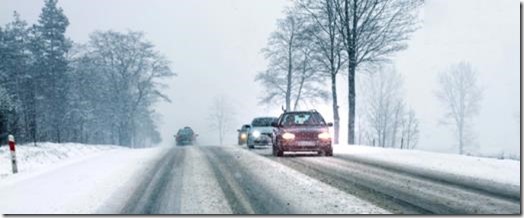

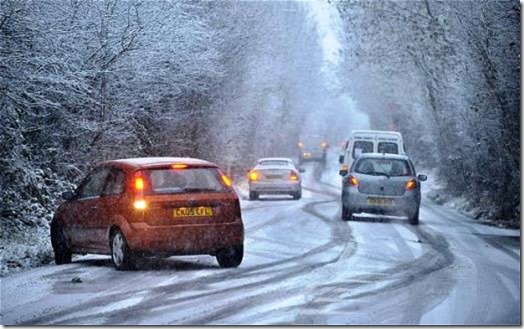
 Basically, if the snow is melting and main roads are clear, there’s no reason not to do lessons. We can dip into some quiet roads and look at how easy it is to skid. If the snow is still falling and main roads are affected by lying snow, then doing lessons carries a much greater risk. A bit of common sense tells you what you can and can’t get away with.
Basically, if the snow is melting and main roads are clear, there’s no reason not to do lessons. We can dip into some quiet roads and look at how easy it is to skid. If the snow is still falling and main roads are affected by lying snow, then doing lessons carries a much greater risk. A bit of common sense tells you what you can and can’t get away with.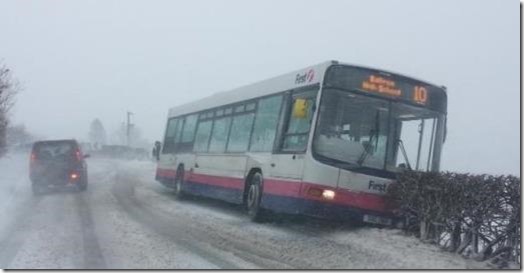


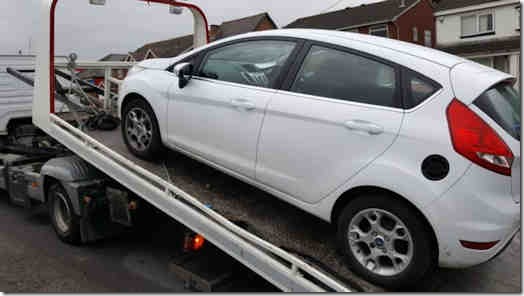
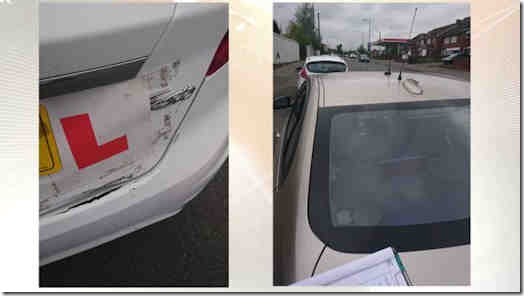

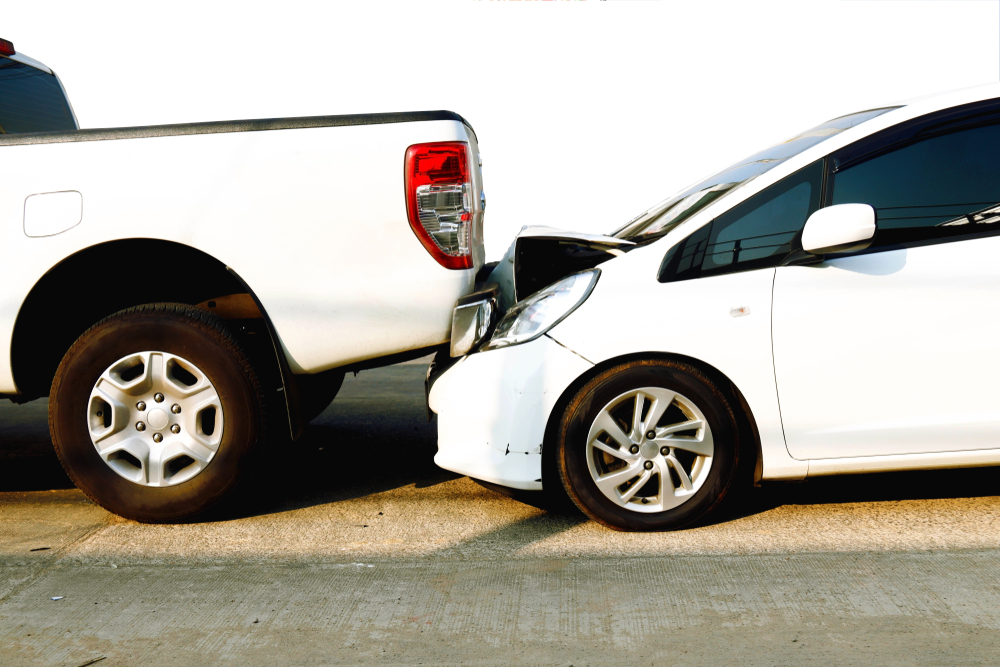 Sometimes you couldn’t make it up.
Sometimes you couldn’t make it up.